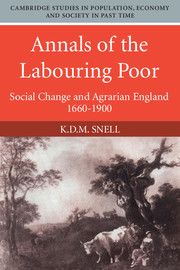Book contents
- Frontmatter
- Contents
- Preface
- Introduction
- 1 Agricultural seasonal unemployment, the standard of living, and women's work, 1690–1860
- 2 Social relations – the decline of service
- 3 Social relations – the poor law
- 4 Enclosure and employment – the social consequences of enclosure
- 5 The decline of apprenticeship
- 6 The apprenticeship of women
- 7 The family
- 8 Thomas Hardy, rural Dorset, and the family
- Appendix: yearly wages
- Bibliography
- Index
- Cambridge Studies in Population, Economy and Society in Past Time 2
8 - Thomas Hardy, rural Dorset, and the family
Published online by Cambridge University Press: 05 March 2012
- Frontmatter
- Contents
- Preface
- Introduction
- 1 Agricultural seasonal unemployment, the standard of living, and women's work, 1690–1860
- 2 Social relations – the decline of service
- 3 Social relations – the poor law
- 4 Enclosure and employment – the social consequences of enclosure
- 5 The decline of apprenticeship
- 6 The apprenticeship of women
- 7 The family
- 8 Thomas Hardy, rural Dorset, and the family
- Appendix: yearly wages
- Bibliography
- Index
- Cambridge Studies in Population, Economy and Society in Past Time 2
Summary
This chapter aims to contribute an historical and social interpretation of Hardy's novels in the light of changes outlined earlier, setting his work against its social and economic context in Dorset. I will outline the conditions faced by the Dorsetshire labourer, and the nature of rural class relations, relating these issues closely to the novels – to assess and largely reject the accounts which stress Hardy's originality as lying in his ‘realism’ and social verisimilitude, and to suggest what historical changes in nineteenth-century Dorset underlay his major preoccupations. The matter is important not only because Hardy's writing encompassed so many of the features of rural life discussed in this book. For it aids first an understanding of questions raised earlier on the reliability and interpretation of literary evidence, whether by social and economic historians or literary critics. The cross-verification of quantitative and empirical evidence with literary statement has been a method of earlier chapters, which aimed to escape the dangers of reliance only on one type of evidence. Social historians traditionally have been dependent on various forms of literary evidence, but have made virtually no attempts to set the bounds to what a writer may know and be able to express of his society and its social structure: to understand in what areas his knowledge is likely to be limited, occluded, or distorted, and for what reasons.
- Type
- Chapter
- Information
- Annals of the Labouring PoorSocial Change and Agrarian England, 1660–1900, pp. 374 - 410Publisher: Cambridge University PressPrint publication year: 1985
- 1
- Cited by

